Babysitter Claims To Be Teaching A 12-Year-Old Responsibilities By Picking Up Her Dogs' Poop, Gets Thoroughly Roasted
Children and teenagers are learning what it means to be responsible. They are attempting to comprehend the rules and apply them in varied contexts.
They are striving toward self-sufficiency, and they care more for their bodies. Some of them are learning about relationships, such as how to manage their moods and impulses, empathize, work through disagreements, and be trustworthy while maintaining promises.
Some are fulfilling school responsibilities and contributing to their households by performing housework and cooperating with norms and expectations. You can choose to be purposeful and deliberate in how you teach your child or teen to act appropriately as a parent or someone in a parenting capacity.
The OP is babysitting two kids, an 8-month-old and a 12-year-old. The OP is trying to teach the older child responsibility, so she's been getting him to help with simple chores.
This includes letting the dogs out and picking up the poop. The OP received a call from the parents saying that she had been leaving dog poop in their yard.
They can tell it belongs to the OP's dogs because it's larger. The OP tried to explain that she has been teaching their child to clean up, and he must have made a mistake, but they didn't care to listen.
Keep scrolling to read the entire story in the OP's own words.
Here's the story's headline

The OP's trying to teach the kid responsibility, so she's been getting him to help with simple chores
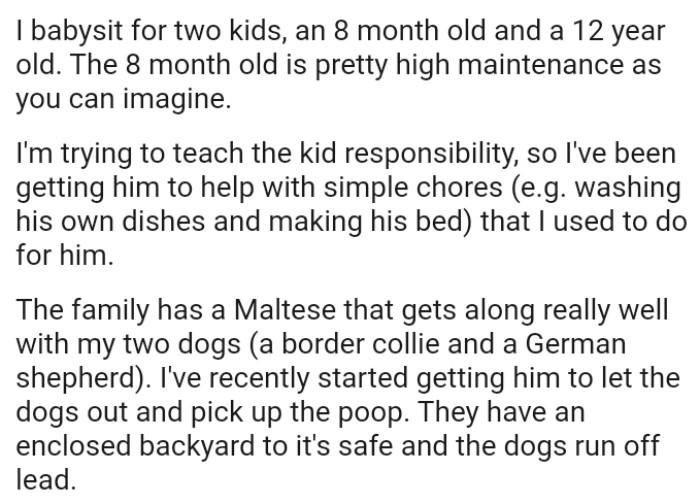
OP tried explaining, and the parents sided with him, saying it's her dog and she should clean up after them
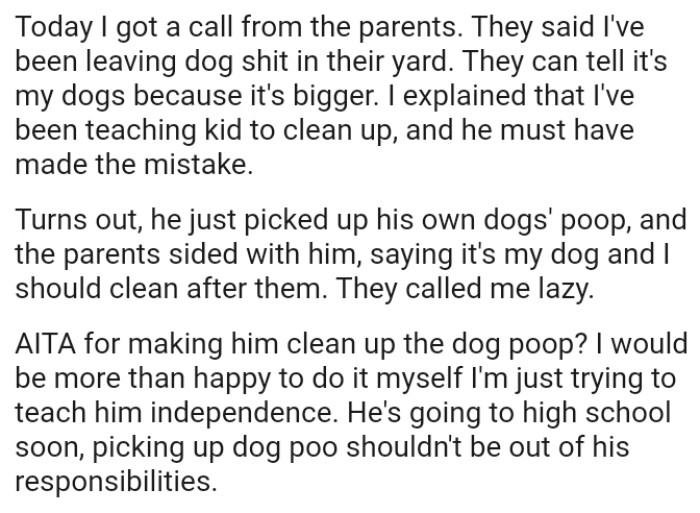
Teaching Responsibility: A Double-Edged Sword
The intention behind assigning responsibilities, such as picking up dog waste, is often rooted in fostering a sense of accountability in children.
According to developmental psychology research, teaching responsibility can positively impact a child's sense of self-efficacy, provided it’s done appropriately.
However, when tasks are perceived as punitive or degrading, they may have the opposite effect, leading to resentment rather than growth.
OP has offered the following explanation for why they think they might be the a-hole:
I made a kid pick up his and my dog's poop. I wanted to teach him responsibility. His parents said I was lazy, and this makes me feel like I'm an asshole. AITA?
This redditor believes the OP should pick up her dogs' poop herself

The kid is being responsible for his own dog, and the OP should take care of hers
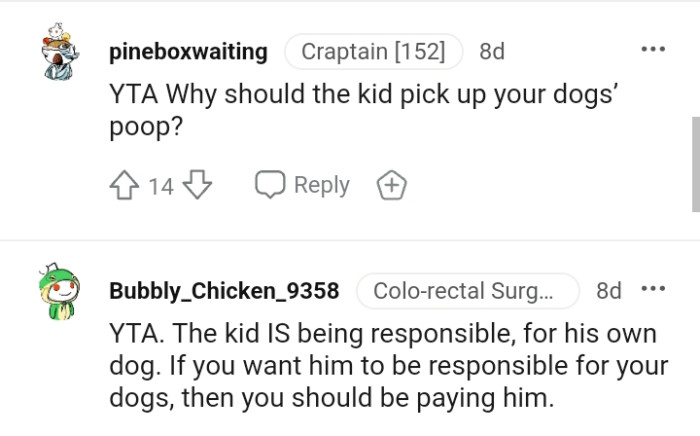
This redditor is surprised the OP was not fired

Psychologists emphasize the importance of age-appropriate responsibilities that align with a child's developmental stage.
For instance, tasks should be framed positively and connected to broader lessons about care and responsibility, rather than simply as chores.
Research supports the idea that when children understand the purpose behind their tasks, they are more likely to embrace them willingly and develop intrinsic motivation.
The kid has only got one dog and not three
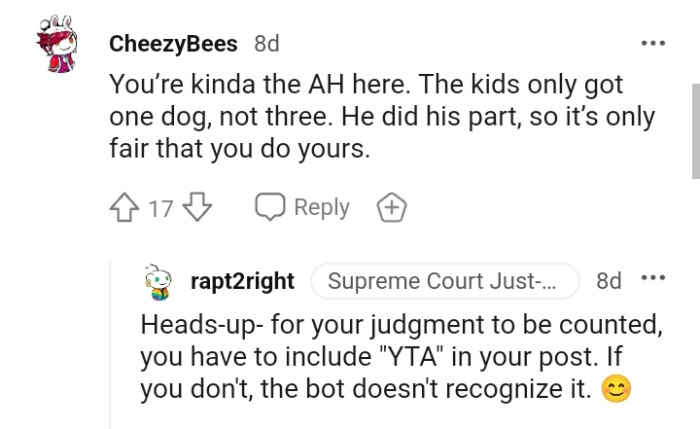
The OP doesn't get to decide what to teach their kids and how to do it
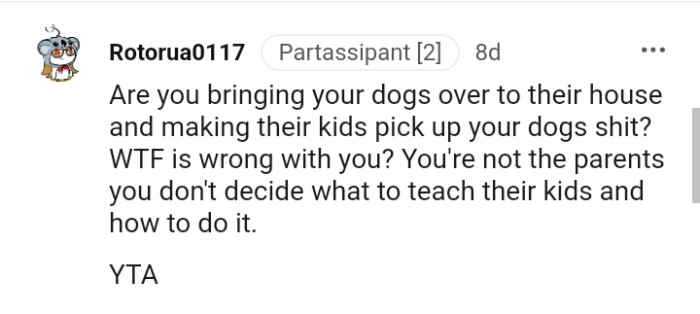
The OP should be cleaning up after her own dogs just like she expects the kid to
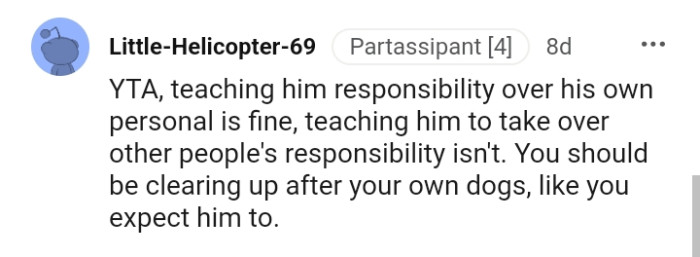
Navigating Social Expectations
This situation also brings to light societal attitudes toward chores and responsibilities among children.
Studies show that children who engage in household tasks tend to develop better social skills and a stronger work ethic.
However, it's essential to ensure these tasks are presented in a way that does not shame or belittle the child, as negative reinforcement can lead to avoidance behaviors.
This Redditor is blown away that the OP even thinks she's not an AH
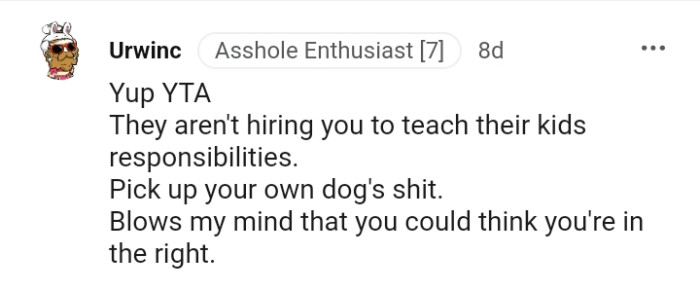
This Redditor would like to know what the OP was thinking

It's not the OP's job to teach the kid how to be responsible
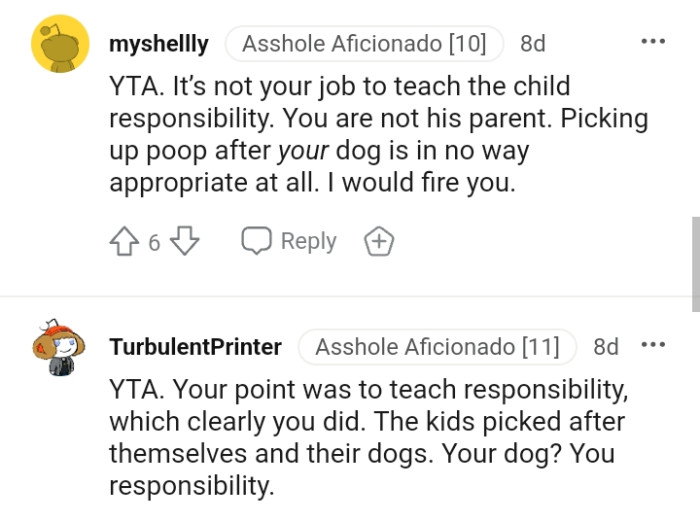
To improve the situation, caregivers might consider involving children in discussions about responsibilities.
Research indicates that when children have a say in what tasks they undertake, their compliance and enthusiasm for those tasks increase.
Additionally, framing these responsibilities as part of a team effort can foster a sense of belonging and cooperation, rather than isolation.
The OP teaching the kid responsibility over his own personal belongings is fine, but teaching him to take over other people's responsibilities isn't. Redditors agreed that the OP should be cleaning up after her own dogs, just like she expects the kid to.
As you can already tell, the OP was declared the AH in the story, and you can drop your own verdict in the comments section below.
Psychological Analysis
This scenario illustrates a common challenge in parenting, where the intent to teach responsibility can sometimes backfire if not approached thoughtfully.
It's crucial to consider how responsibilities are framed, ensuring they promote a sense of competence rather than obligation.
Analysis generated by AI
Analysis & Alternative Approaches
Ultimately, teaching responsibility is a nuanced process that requires sensitivity to children's needs and perceptions.
As noted in developmental psychology, 'the way responsibilities are introduced can significantly impact a child's willingness to engage and learn.'
With thoughtful approaches, caregivers can cultivate a positive environment that encourages growth and responsibility.



